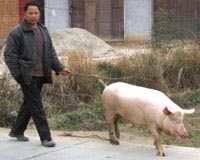| . |  |
. |
Beijing (AFP) May 19, 2009 United Nations chief Ban Ki-moon urged people to remain vigilant against swine flu on Tuesday as the number of cases around the world shot up to almost 10,000. Previous pandemics had shown flu outbreaks could start mild and worsen, Ban said as he addressed the World Health Organisation's annual assembly in Geneva. "That is why the world must remain vigilant and alert to the warning signs." The UN health agency said cases had soared by more than 1000 since Monday with 9830 infections now in 40 countries, including 79 deaths. The WHO has so far resisted pressure to declare a full-fledged swine flu pandemic, but anxiety about the spread of the virus - especially in Asia and the Americas - is growing. Japan reported 193 swine flu infections as of Tuesday and closed more than 4,000 schools, colleges and kindergartens for the rest of the week to slow the spread of the virus, officials said. Ban was hold talks here with leaders of some of the world's biggest pharmaceutical companies on the development of a vaccine. About 30 vaccine makers from 19 industrialised and developing countries were invited by the WHO to the discussions, which officials said focused on the cost of the vaccine and its availability in the most vulnerable poor countries. Ban told the WHO's assembly afterwards that partnerships with the private sector would be "absolutely vital". "Solidarity in the face of this particular outbreak must mean that all have access to drugs and vaccines," he told the group's 193 member states. "It means that virus samples and data are shared." The WHO has been weighing the risks of halting production of the seasonal flu virus to free up production capacity for a swine flu vaccine. An extract of a WHO forecast presented to vaccine makers said it should be possible to produce 4.9 billion doses of a swine flu vaccine in a year, but only if full-scale production was launched. The UN health agency is counting on output of 94.3 million doses a week, according to the presentation made to drugs companies, part of which was seen by AFP. "That is a very optimistic maximum capacity," WHO Director General Margaret Chan told journalists after the meeting, adding two doses might be needed for immunity from swine flu. She also told journalists that most of the cases of swine flu in Japan were linked to schools and the pattern of progress of the virus there was "not unusual" as she thanked Japanese authorities for their transparency. Swiss pharmaceutical group Novartis said it had received samples of the new A(H1N1) influenza virus and was waiting for the green light from WHO to start making a vaccine. But it would take three to four weeks to get production up and running, said a spokesman. Vaccine developments will be eagerly watched in world capitals, none more so than in Tokyo where officials are struggling to keep a lid on Japan's growing epidemic. Experts warned infections had probably already spread to other regions including the capital Tokyo, which with almost 36 million people is the world's most populous urban area. Japan's first domestic cases of swine flu were confirmed on Saturday in the western cities of Kobe and Osaka, where they spread quickly in and between two high schools that had met for a volleyball tournament. Hundreds have since been tested for the virus, and face masks have become ubiquitous on subways and in shopping centres in the affected prefectures of Osaka and Hyogo in the central region of the main island of Honshu. New York medical authorities were meanwhile also testing on Tuesday to see whether swine flu killed a 16-month-old boy who died with a high fever. "We don't know yet whether the child who died contracted the H1N1 virus," Mayor Michael Bloomberg told a press conference. "The tests won't be done till later today or tomorrow." New Yorkers are on high alert after the city's first fatality from swine flu, a school vice principal who died over the weekend. Apart from 72 deaths in Mexico, swine flu has killed six people in the United States, and one each in Canada and Costa Rica.
Share This Article With Planet Earth
Related Links Epidemics on Earth - Bird Flu, HIV/AIDS, Ebola
 China reports suspected swine flu case
China reports suspected swine flu caseBeijing (AFP) May 18, 2009 China reported Monday a suspect case of swine flu in its southern Guangdong province involving a man who recently returned to the mainland from Canada and the United States. The man, aged 59, was diagnosed with the A(H1N1) virus, as it is officially known, following a preliminary test in the provincial capital of Guangzhou, the health ministry said in a statement on its website. China ... read more |
|
| The content herein, unless otherwise known to be public domain, are Copyright 1995-2009 - SpaceDaily. AFP and UPI Wire Stories are copyright Agence France-Presse and United Press International. ESA Portal Reports are copyright European Space Agency. All NASA sourced material is public domain. Additional copyrights may apply in whole or part to other bona fide parties. Advertising does not imply endorsement,agreement or approval of any opinions, statements or information provided by SpaceDaily on any Web page published or hosted by SpaceDaily. Privacy Statement |